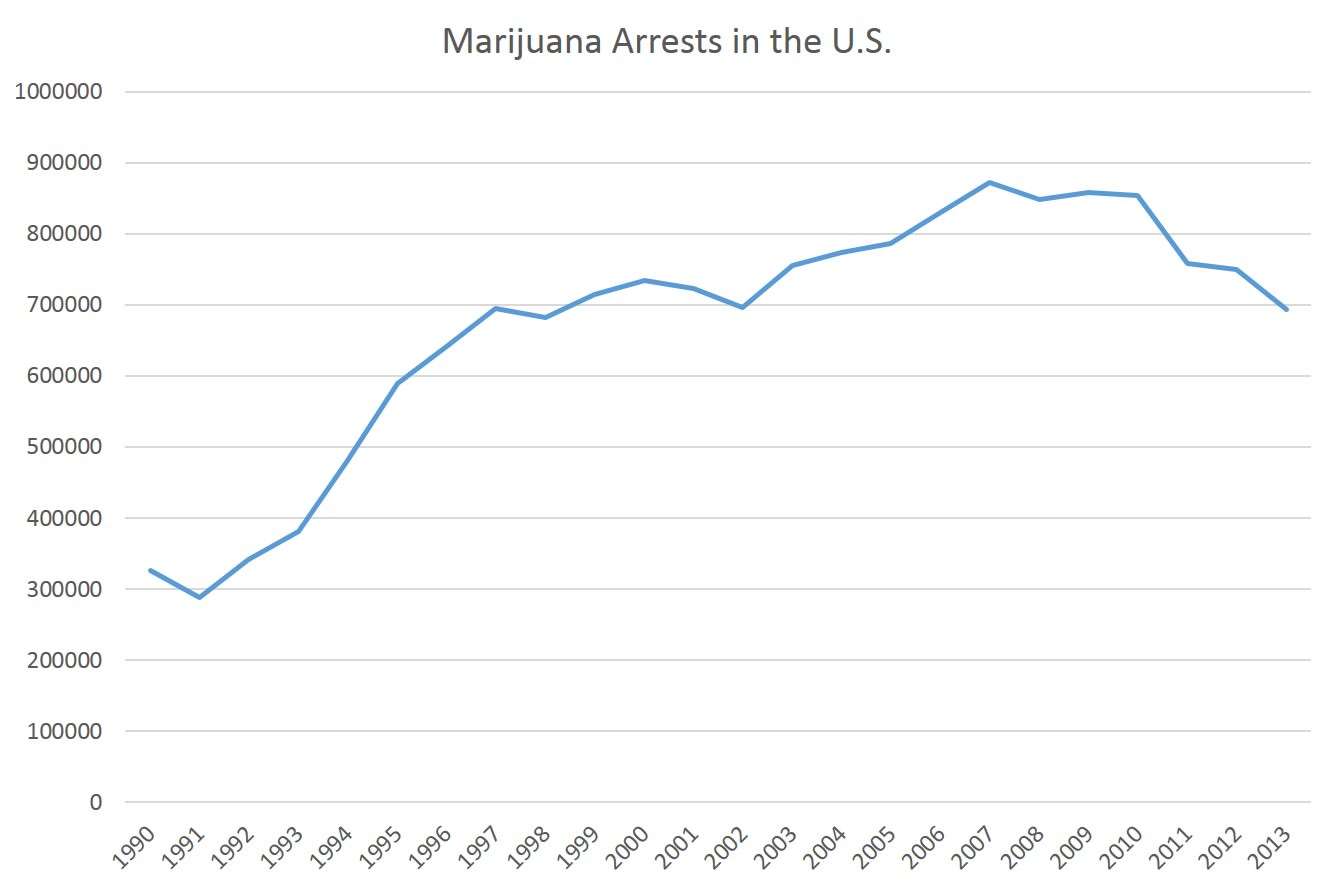Marijuana Arrests Continue to Fall As Decriminalization and Legalization Spread
According to FBI numbers released today, police made 1,501,043 drug arrests last year, down from 1,552,432 in 2012, a drop of about 3 percent. Marijuana accounted for about 693,000 of those arrests (46 percent), down from about 750,000 (48 percent) in 2012. The 7.6 percent drop in pot busts entirely accounts for the decline in total drug arrests, which otherwise would have risen. As usual, the vast majority of marijuana arrests—88 percent, or about 609,000—involved simple possession, as opposed to manufacture or sale.

The peak year for marijuana arrests was 2007, when there were about 873,000, three times as many as in 1991. The number fell to 848,000 in 2008, rebounded to 858,000 in 2009, and has been declining since then. Contributing to that trend, Colorado and Washington last year stopped arresting people for possessing less than an ounce of marijuana, as required by legalization measures that voters approved in 2012. Prior to that change, Colorado police were arresting about 10,000 people for marijuana possession each year. The annual number in Washington was about 6,000. Marijuana possession arrests in New York City, which peaked at more than 50,000 in 2011, also fell last year, from 39,218 to 28,644.
The downward national trend should continue. Washington, D.C., decriminalized marijuana possession last spring, and today the NYPD announced that it will further reduce arrests of cannabis consumers, beginning later this month. A legalization measure approved by voters in Alaska last week will eliminate arrests for possessing up to an ounce in public (possession of small amounts in the home was already protected under a 1975 Alaska Supreme Court decision). Oregon, the other state where voters approved legalization last week, had already decriminalized possession of less than an ounce (although the ballot initiative will eliminate the fine). Residents of those three jurisdictions also voted to abolish penalties for home cultivation within specified limits. If approved, the marijuana initiatives that are expected to be on the ballot in 2016 could take another bite out of pot busts, although California, Maine, and Massachusetts, three states where such measures are likely, already have decriminalized possession of small amounts.
Editor's Note: As of February 29, 2024, commenting privileges on reason.com posts are limited to Reason Plus subscribers. Past commenters are grandfathered in for a temporary period. Subscribe here to preserve your ability to comment. Your Reason Plus subscription also gives you an ad-free version of reason.com, along with full access to the digital edition and archives of Reason magazine. We request that comments be civil and on-topic. We do not moderate or assume any responsibility for comments, which are owned by the readers who post them. Comments do not represent the views of reason.com or Reason Foundation. We reserve the right to delete any comment and ban commenters for any reason at any time. Comments may only be edited within 5 minutes of posting. Report abuses.
Please to post comments


Ok, teabaggers, you're always proposing repeal. Do you have a replacement plan?
Yes. Obamapot.
The terrorists are winning!
It's good to see that something has improved under Obama's reign.
Until now, the best I could say about Obama is that he's been no worse than McCain would have been.
Prohibition ended under FDR's reign yet I don't see too many libertarians liking him over that.
And does that mean that libertarians are going to spend the next 80 years complaining about the pot laws?
Yes. Yes, it does.
We're still complaining about the liquor laws, aren't we?
Hell, today on this blog we're arguing about the political merits of getting rid of the federal drinking age.
It would've been done under anyone's reign. The policy was universally disregarded, disparaged and popularly considered a failure.
I'll take it. But, the improvements where in spite of Obama. Not because of anything he's done.
At least FDR was a wet